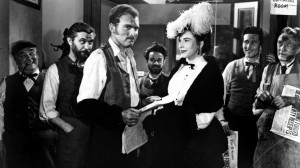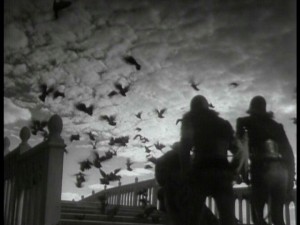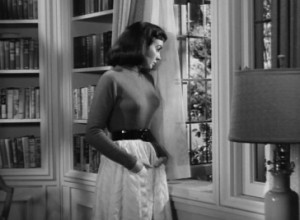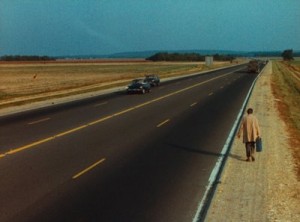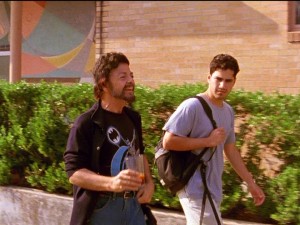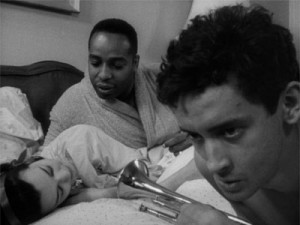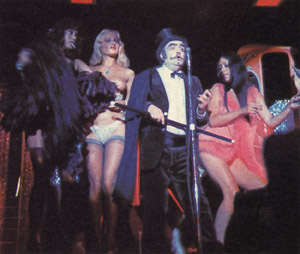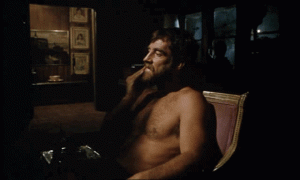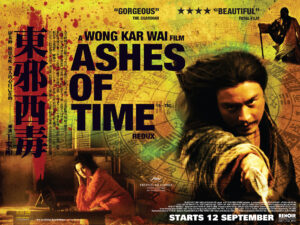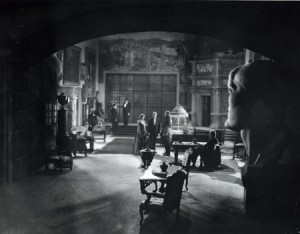From Cinema Scope, Winter 2005, issue 21. Much of this column is out of date — starting with the URL in the first sentence, which none the less does take you somewhere that’s related. — J.R.
My most fruitful recent discovery for ordering rare films on DVD is www.superhappyfun.com — a mysterious U.S.company whose name sounds oddly Japanese and who makes its own Region 0 DVD-Rs (“a movie that’s been ported over from VHS, tweaked with a time-based corrector, and recorded onto a consumer-grade DVD”), packed in envelopes rather than boxes to save costs and usually priced at $13 apiece. The prints used vary in quality and are ranked in their catalogue entries between 10 (best) and 4 (worst); I’ve found so far that anything below 7 borders on the dubious (such as my blotchy albeit subtitled copy of Jacques Rivette’s Paris Belongs to Us, assigned a 6).
Among the treasures I’ve recently acquired are Edward Yang’s A Brighter Summer Day (the full version, with English subtitles, on two discs, for $15), The Exterminating Angel subtitled, The Girl Can’t Help It letterboxed, a couple of restored Ernst Lubitsch musicals (Monte Carlo and One Hour with You), Joseph Losey’s M, Jacques Tourneur’s Nightfall, Kinugasa’s A Page of Madness (which has no intertitles, so subtitles aren’t needed), Fuller’s Park Row, and Antonioni’s The Passenger. (From the pricier “Shocking Videos”-—see www.revengeismydestiny.com–I recently ordered Flaming Creatures + Normal Love and Karlson’s The Phenix City Story complete with the newsreel prologue for $20 each, but it’s too soon to report back any verdicts.) If you’re wondering about the legality of all this, “SuperHappyFun” responds to your concern in the following way:
“The section of American copyright law known as `The Berne Act’ clearly states: films unreleased in the United States, including original version [sic] of films altered and/or edited in the United States, are not protected by American copyright; thus, they are considered public domain. The entire purpose of our company is to provide (otherwise unavailable) films to the serious video collector. We do not offer videos owned by American releasing companies. If a film should become available domestically, or of another seller should offer a better copy, we immediately stop offering it to our clients.
“…No rights are given or implied. All titles are sold purely for research purposes. No entertainment should be gained from any title on this site. If you enjoy anything purchased at SuperHappyFun.com, destroy it immediately.”
Even before the second paragraph veers into the stratosphere, one wonders how this reasoning can justify their selling copies of Kill Bill Vol. 1 and Wong Kar-wai’s 2046. Still, their site includes a list of about three dozen “other rare movie sites” (starting with “Shocking Videos”), which shows that their interest isn’t strictly mercenary. And speaking as someone who enthusiastically aspires to economic incorrectness whenever it’s legal, I can only hope this cheerful enterprise can stay in business — especially if one considers that at least half of the titles I recently purchased from this source are extremely unlikely to ever come out on commercial labels.
This certainly applies to the original version of Orson Welles’ Othello —- the version without the terrible changes in its soundtrack authorized by his daughter Beatrice (well documented by Michael Anderegg in his book on Welles and Shakespeare). So when I recently picked up a copy of Othello + Dossier Secret (aka Mr. Arkadin) in Paris, it was with the vain hope that it might be the “illegal” untampered-with version of the former. So potential buyers should be warned off —- as should those who, like me, purchase the French Collection Ciné Club DVD of Fritz Lang’s Les bourreaux meurent aussi (aka Hangman Also Die) believing the false information on the box that it’s the original with French subtitles rather than the French-dubbed version. By contrast, you can trust Editions Montparnasse’s Collection RKO when it comes to getting the English as well as dubbed versions of Angoisse (Jacques Tourneur’s Experiment Perilous), L’Enigme du Chicago Express (Richard Flesicher’s superb The Narrow Margin), La Maison dans l’ombre (Nicholas Ray’s On Dangerous Ground), and Un Si Doux Visage (Otto Preminger’s Angel Face) — even if the accompanying trailers on these DVDs are most often only dubbed.
Another way that purchases of some titles from foreign sources can be chancy: you can never be entirely sure that the same title won’t be out in your own country a week, a month, or a year later. This is what happened while I was attending the Viennale last October, when I decided to buy at Satyr-Filmwelt the multilingual German edition of Duck Soup (Die Marx Brothers Im Krieg) — spoken in five languages and subtitled in no less 16 —- only to discover when I got back to Chicago in time for the miserable Presidential election that a U.S. release was already imminent (perhaps in anticipation of the election’s results). On the other hand, purchasing the German edition of Tati’s Trafic (with a choice of French or German dialogue) at the same store was a much safer bet, since there don’t yet appear to be any other DVDs of this in the offing.
Here’s a good-luck story: a lingering affection for Eric Rohmer’s Le signe du lion (1962), combined with its usual lack of unavailability outside a pricey Rohmer box set, induced me to pick up a remaindered Region 2 copy of it in Paris for about nine Euros. Only later did I discover that the disc’s bonus made it a bonanza: Rohmer’s 66-minute 1968 TV documentary Louis Lumière is not only a first-rate anthology of that pioneer’s work; it also features (unsubtitled) interviews with Jean Renoir and Henri Langlois, the latter offering offscreen commentaries on many of the Lumière shorts included. (Another recent case where the extra surpasses the main course: the inclusion of Georges Franju’s 1949 The Blood of the Beast on Criterion’s release of his 1959 feature Eyes without a Face.)
***
This has been a legendary period for box sets.Criterion has lately been going through an encyclopedic phase exemplified by two-discs sets devoted to The Battle of Algiers and Slacker, both packaged with substantial booklets and offering overall the kind of thoroughness one usually expects to find only in reference books. If the former takes on something as huge as the Algerian war while the latter devotes such exhaustive attention only to the Austin alternative film scene in the 80s, as experienced and partially created by Richard Linklater — offering what may be more material than anyone but other participants in that scene could handle —- it’s still good to know that it’s all finally been gathered together in one place.
Even more substantial —- though understandably less exhaustive — are the eight discs and booklet comprising Criterion’s “John Cassavetes: Five Films,” a compendium including not only Shadows, Faces, A Woman Under the Influence, both versions of The Killing of a Chinese Bookie, and Opening Night, but also a wide array of supporting documentary materials, the most valuable of which may be the extended audio interviews with Cassavetes conducted by Michel Ciment about the last three of these features. Having already written in this magazine about the long-lost original version of Shadows that surfaced in Rotterdam (and hasn’t been seen since, outside of Ray Carney’s classes), I should add that I regret yet on reflection would still defend the absence of that version in this box set: as an apprentice effort, it isn’t on the same level as the other Cassavetes works included, either as an achievement or as an authorized part of his oeuvre — even though it should be made available to scholars. For me, however, the biggest lacuna here is Cassavetes’ sublime Love Streams —- which fortunately has just become available in a decent edition on a French Region 2 DVD.
Three more formidable door stops should be cited: “More Treasures from American Film Archives, 1894-1931,” three discs and 186 pages of notes offering a worthy successor to the previous volume; the key prize here is Lubitsch’s 1925 Lady Windermere’s Fan. Kino Video’s “The Wong Kar-wai Collection” (As Tears Go By, Days of Being Wild, Chungking Express, Fallen Angels, and Happy Together) is indispensable — though I’m sorry to find Ashes of Time, available on a different label, missing here. And, again from France, two matching box sets compiled by Noël Simsolo devoted to nine late features by Mizoguchi Kenji. I could afford only one of these sets, even at a discount, so I opted for the one containing Chikamatsu Monogatari, Sansho the Bailiff, The Empress Yang Kwei Fei, Shin Heike Monogatari, all in acceptable transfers, plus a disc of supplements mainly consisting of clips and talking heads (all of whom are French, apart from critic Shigehiko Hasumi speaking French). The other set of five includes Ugetsu Monogatari, Miss Oyu, The Life of Oharu, Gion Festival Music, and Street of Shame. Both fold-out boxes are subtitled only in French, and, as with other French DVDs, if you want to shelve them so that you can read the titles on the spine alongside other DVDs from the U.S. and the U.K., you have to shelve them upside-down. (It’s a French trait to be incompatible with everyone else that can probably be traced all the way back to the development of SÉCAM.)
***
For that matter, the elegant BFI edition of Un chien andalou and L’age d’or, however welcome, won’t fit on ordinary DVD shelves at all. Packaged like a Buñuelian Surrealist object — in a thick white box reminding me of the mysterious box held by the Chinese brothel customer in Belle de jour —- it includes commentary on both films by Robert Short and José Luis López-Linares and Javier Rioyo’s feature-length documentary A Propósito de Buñuel (2000).
Eighty years after its first release, one of Carl Dreyer’s least well-known and least characteristic major films, Michael (1924), has appeared on DVD on two separate continents in separate editions: on Kino Video in North America, and on two Region 0 discs with a 20-page illustrated booklet from the estimable Masters of Cinema in Europe, released by Eureka in the U.K. The ideological differences in packaging are worth noting: Kino sandwiches it between Richard Oswald’s 1919 Different From the Others and William Dieterle’s 1928 Sex in Chains in a series called “Gay-Themed Films of the German Silent Era” while MOC gives more emphasis to the aesthetic aspects. But one can’t charge the American edition for being any less serious (an accusation I recently made at some length against the U.S. version of the Chaplin feature DVDs released by MK2 and Warners, in the Fall 2004 issue of Cineaste). In fact, one of the two discs in the MOC set —- David Shepard’s U.S. transfer of Michael with a commentary by Danish film scholar Casper Tybjerg and a piano score by Neal Kurz —- is identical to what Kino’s offering. (One way among others that Tybjerg makes me feel like I’m getting a liberal arts education from his remarks is the correct but unexpected Danish pronunciations he offers of various names — including his own surname and Dreyer’s middle name — and film titles.)
MOC’s second disc offers a different — and, for me, better and more interesting — score, by Pierre Oser, for piano, clarinet, and cello, done for (and with) an earlier 1993 transfer for European TV, as well as a half-hour audio interview with Dreyer in English done during his 1965 visit to New York. You can’t go wrong with either edition, but hardcore Dreyer buffs won’t want to miss this extra, even though the identity of the interviewer still hasn’t been established.


